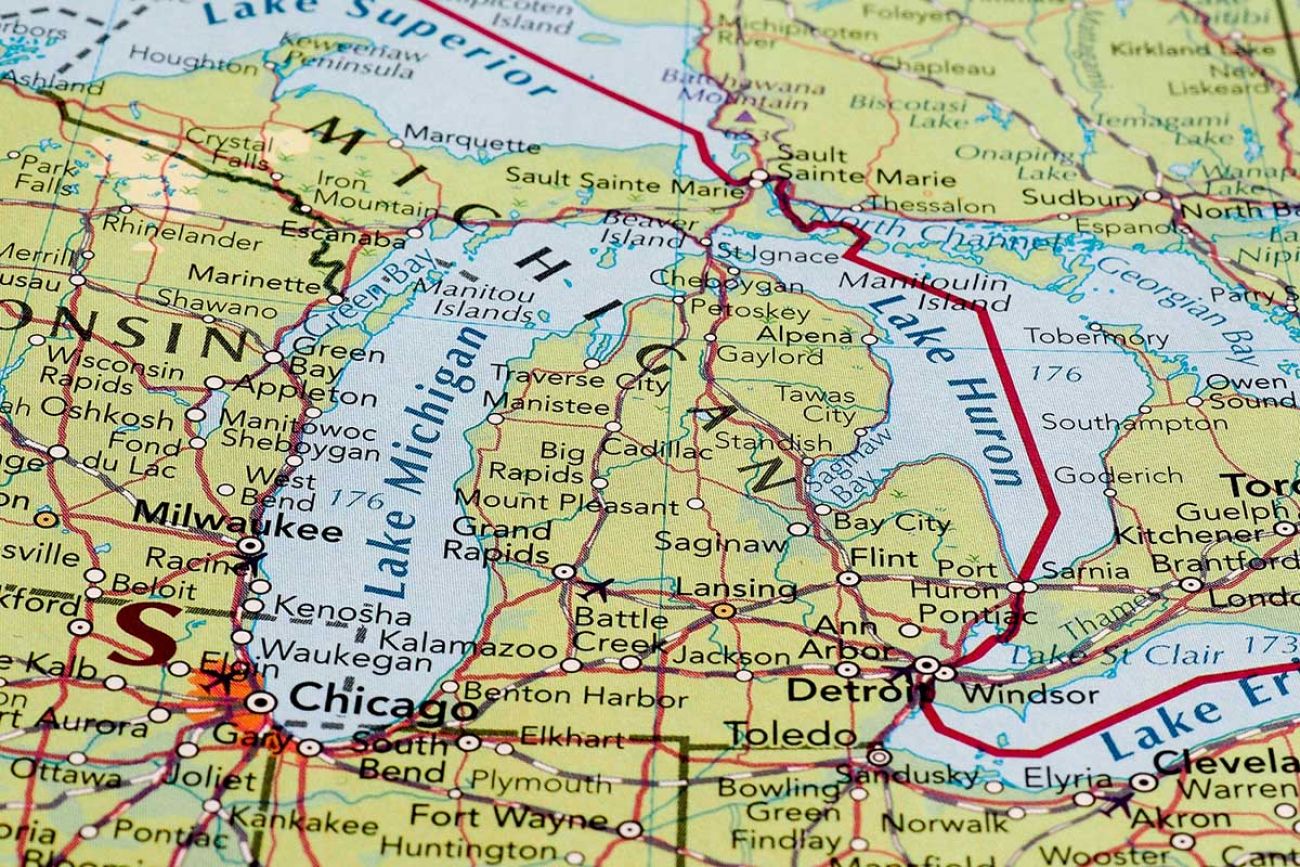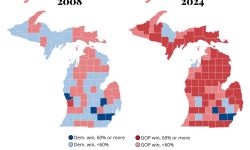GOP wants to split Michigan Electoral College votes. That would help the GOP.

LANSING — Republicans in the Michigan House are considering a plan to award most of the state’s presidential electors by congressional district, an overhaul that could give new influence to voters in rural areas dominated by GOP candidates.
Legislation debated Tuesday would likely help Republican candidates by ending the state’s winner-take-all system that last year allocated all 16 Electoral College votes to Democratic President Joe Biden because he won the popular vote by 3 percentage points.
Instead, Michigan would join Maine and Nebraska by awarding one elector to the winner of each congressional district, and then two electors to the winner of the statewide vote.
Related:
- GOP investigation finds no Michigan vote fraud, deems many claims ‘ludicrous’
- Michigan GOP relaxes ballot drop box reform. Critics say plan is still unfair
- Census counts mean Michigan, Great Lakes states to lose power in Congress
- Activists want to oust Michigan GOP director for saying Trump ‘blew it’ in 2020
- Michigan’s political geography is shifting. These interactive maps show how.
- As Michigan begins redistricting, ‘communities of interest’ take center stage
- We read all Michigan election reform bills. Many would add hurdles to voting.
That’s a system that would have allowed former President Donald Trump to evenly split the state’s electors with Biden, despite his loss.
State Reps. Beau LaFave of Iron Mountain and Jeff Yaroch of Richmond contend their legislation is about giving “voice” to voters in all parts of Michigan, not just those in major population centers. It would encourage presidential candidates to campaign in diverse regions of the state, they told colleagues in committee.
“I’m not trying to rig the system for any political party — obviously, both of them have massive flaws — but we’ve got the situation in Michigan where a lot of people aren’t heard, and they don’t feel as though they’re being heard, and that their vote doesn’t count,” LaFave said.
LaFave said he and Yaroch did not do a historical review to assess how the proposed Electoral College allocation would have influenced past elections because, he said, the legislation is “not about who won or lost.”
But the proposal would have benefited many Republican presidential candidates — at least under current congressional maps set to be redrawn this year by a new independent commission, according to an analysis by Bridge Michigan.
It would have given a majority of electors, for instance, to Republicans who lost Michigan’s popular votes in 2004 and 2012, President George W. Bush and GOP nominee Mitt Romney.
Michigan lost a congressional seat in 2002 and 2012 because of population declines, and it may lose another seat next year. As it stands, the state is home to 14 congressional districts, each designed to include roughly 700,000 residents.
Current district maps drawn by the GOP-led Legislature in 2011 have tended to favor Republicans, but the state’s delegation is now evenly split between the two major parties.
Democratic state Rep. Karen Whitsett of Detroit called the presidential election legislation “suspicious” and accused Republicans of trying to “move the goalposts” after Trump’s loss last year.
A look at the changes
Indeed, the plan would have disproportionately hurt Democrats, who won the popular vote in five of Michigan’s past six elections:
2020: Biden won by 154,188 votes but Trump carried eight of the state’s 14 congressional districts. Under the proposal, Biden and Trump would have each received eight electoral votes.
2016: Trump beat Democrat Hillary Clinton by 10,704 votes, carrying nine out of 14 congressional districts. Under the proposal, Trump would have been awarded 11 of 16 electoral votes.
2012: Then-President Barack Obama beat Romney by 449,313 votes, but he only carried five out of 14 congressional districts. That would have meant Obama would have won nine electoral votes to seven for Romney.
2008: Obama beat GOP nominee John McCain by 823,275 votes and carried 12 out of 15 congressional districts. The proposal would have given McCain three electoral votes.
2004: Democratic nominee John Kerry beat then-President George W. Bush by 165,437 votes, but Bush won 10 of 15 congressional districts. That means Bush would have won 10 electoral votes to seven for Kerry.
2000: Then-Vice President Al Gore beat Bush by 217,279 votes in Michigan, about 5 percentage points, and won nine out of 16 congressional districts. Under the plan, Gore would have won 11 votes to Bush’s seven.
Awarding presidential electors by congressional district is not a new idea. The format may have encouraged Trump to campaign last year in Maine, where he won the popular vote in one of two congressional districts to secure one of four electors in a state Biden won by 9 percentage points.
The new Michigan legislation is “about making sure that the entire state is heard, that the U.P. is just as important to the presidential candidate race as Grand Rapids or Macomb or Wayne or Lansing,” Yaroch said.
Rep. Matt Koleszar, D-Plymouth, questioned whether candidates would be less likely to campaign in Michigan if they were not guaranteed all electors for a win. And he argued the plan could disenfranchise voters by reducing the importance of the statewide popular vote.
“What becomes of the constitutional command of one person, one vote, in a system designed intentionally to weigh the votes of some voters more heavily than others?” Koleszar asked.
The Upper Peninsula, for instance, has about 311,000 residents, compared to 1 million in greater Grand Rapids.
Biden won Michigan last year with strong performances in major cities and significant gains in suburbs, including Oakland and Kent counties. But Trump dominated rural Michigan, winning the popular vote in 73 of the state’s 83 counties.
Diluting Detroit’s influence
Michigan Republicans discussed similar Electoral College overhaul legislation in 2012 after Obama beat Romney to win re-election, and LaFave introduced a nearly identical bill in 2019.
U.S. Rep. Bill Huizenga of Zeeland, whose 3rd Congressional District went for Trump by 12 percentage points last year, has urged the state Legislature to consider the change.
“This would remove Detroit’s outsized influence and encourage candidates to compete for votes in each congressional district across the entire state, not just the big cities,” Huizenga wrote on Facebook in January, days after Trump’s false claims of widespread election fraud spurred an insurrection at the U.S. Capitol.
“The end result would make your vote here in West Michigan even more important.”
Michigan lawmakers in recent years have also contemplated joining a national popular vote compact to change the way the presidential election is decided. If enough states signed on to decide the contest, each would award its electors to the presidential candidate that won the most votes nationwide.
Had that system been in place, there could have been a President Al Gore and a President Hillary Clinton.
Both Democrats lost the Electoral College, but Gore beat Bush by half a million votes in 2000, and Clinton beat Trump by nearly 3 million votes in 2016.
House Speaker Jason Wentworth, R-Clare, said last month that the national popular vote idea is “bubbling up again” in Lansing but declared it “dead on arrival” in his chamber.
Basing presidential outcomes on the national popular vote “would take our votes and give them away to out of touch liberals in New York and California,” Wentworth wrote on Facebook, echoing a claim disputed by advocates.
“I can’t stand for that.”
The House Elections Committee did not vote on the Electoral College allocation legislation on Tuesday, but Chair Ann Bollin, R-Brighton Township, indicated support for the plan.
“I know the conversation generally seems to turn to candidates, but in my opinion, this has to be about the voters in the state, and their voice being heard,” she said.
See what new members are saying about why they donated to Bridge Michigan:
- “In order for this information to be accurate and unbiased it must be underwritten by its readers, not by special interests.” - Larry S.
- “Not many other media sources report on the topics Bridge does.” - Susan B.
- “Your journalism is outstanding and rare these days.” - Mark S.
If you want to ensure the future of nonpartisan, nonprofit Michigan journalism, please become a member today. You, too, will be asked why you donated and maybe we'll feature your quote next time!




